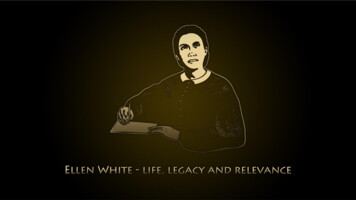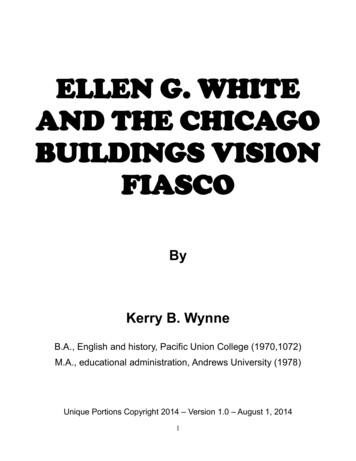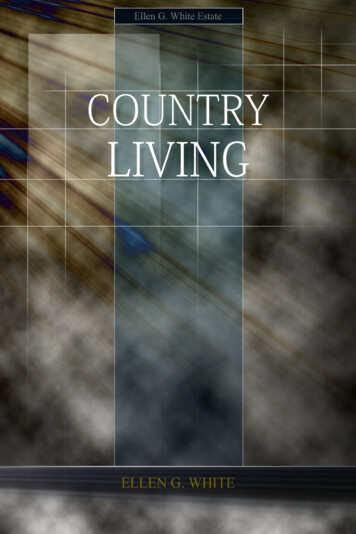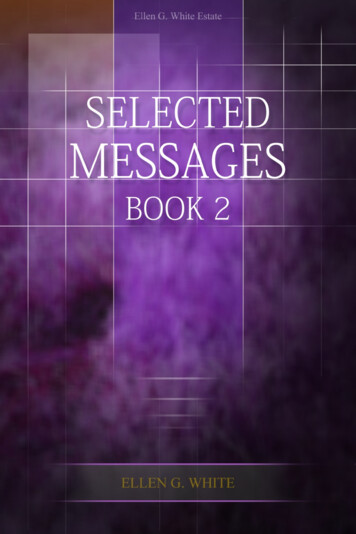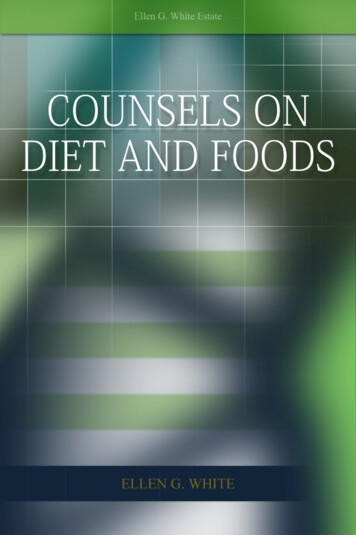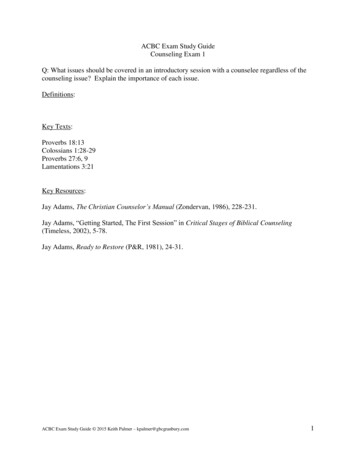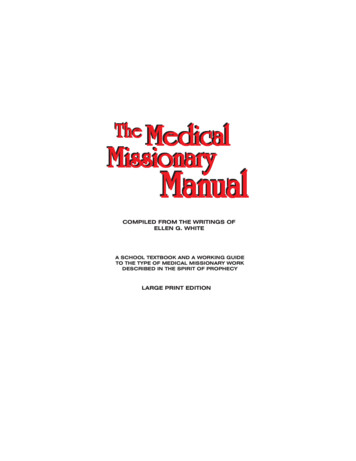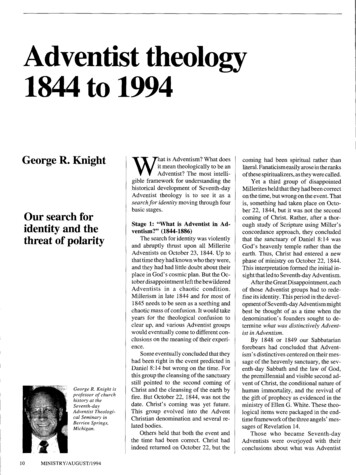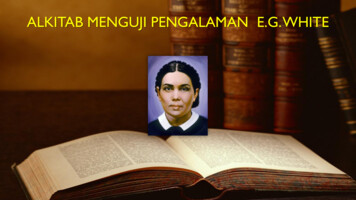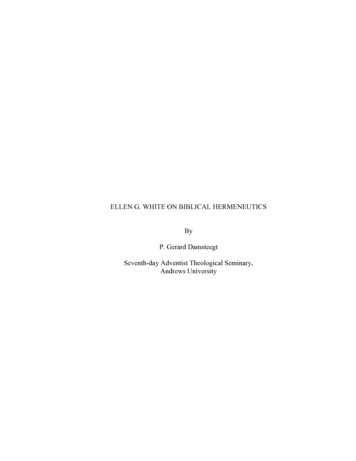
Transcription
ELLEN G. WHITE ON BIBLICAL HERMENEUTICSByP. Gerard DamsteegtSeventh-day Adventist Theological Seminary,Andrews University
TABLE OF CONTENTSLIST OF ABBREVIATIONS . . . . . . . . . . . . . . . . . . . . . . . . . . . . . . . . .3INTRODUCTION . . . . . . . . . . . . . . . . . . . . . . . . . . . . . . . . . . . . .4ChapterI. GENERAL OBSERVATIONS ON INTERPRETING THE BIBLE . . . .Introduction . . . . . . . . . . . . . . . . . . . . . . . . . . . . . . . . . .The Quest to Understand the Biblical Text . . . . . . . . . . . . . . . .Discover and Understand the Biblical Text . . . . . . . . . . . . . . . .Examine Teachings, Beliefs and Practices of Seventh-day AdventistsLimitations on the Interpretation of the Scriptures . . . . . . . . . . . .Human Limitations . . . . . . . . . . . . . . . . . . . . . . . . . . .God’s Infinity . . . . . . . . . . . . . . . . . . . . . . . . . . . . . .Warnings against the Use of Higher or Historical Criticism . . .55671113131415II. FOUNDATIONS OF BIBLICAL INTERPRETATION. . . . . . . . . . . . .18Introduction . . . . . . . . . . . . . . . . . . . . . . . . . . . . . . .Inspiration and Authorship . . . . . . . . . . . . . . . . . . . . . .The Accuracy of the Bible . . . . . . . . . . . . . . . . . . . . . . .Perfect Concepts in Imperfect Language . . . . . . . . . . . .Translation and Copyist Errors . . . . . . . . . . . . . . . . .Divine Preservation . . . . . . . . . . . . . . . . . . . . . . . .Presence of Contradictions . . . . . . . . . . . . . . . . . . . .The Authority of the Bible . . . . . . . . . . . . . . . . . . . . . .The Basis of Authority . . . . . . . . . . . . . . . . . . . . . .Authority in Faith and Doctrine . . . . . . . . . . . . . . . . .Authority in History . . . . . . . . . . . . . . . . . . . . . . . .Authority over Human Wisdom, Judgment, and ExperienceAuthority over the Spirit of Prophecy . . . . . . . . . . . . .The Unity of the Bible . . . . . . . . . . . . . . . . . . . . . . . . .Basis of Unity . . . . . . . . . . . . . . . . . . . . . . . . . . .1818202021232324242526262729291.
Divine authorship . . . . . . . . . . . . . . . . . . . . . . . . . . . .Divine illumination . . . . . . . . . . . . . . . . . . . . . . . . . . .Bible study, research and unity . . . . . . . . . . . . . . . . . . . .The Nature of Unity . . . . . . . . . . . . . . . . . . . . . . . . . . .The diversity of Bible writers . . . . . . . . . . . . . . . . . . . .Progressive revelation . . . . . . . . . . . . . . . . . . . . . . . .Harmony between the Old Testament and the New Testament .Unity, not uniformity . . . . . . . . . . . . . . . . . . . . . . . . .2929303030313334III. PRINCIPLES OF BIBLICAL INTERPRETATION . . . . . . . . . . . . . .35Introduction . . . . . . . . . . . . . . . . . . . . . . . . . . . . . . . . . . . . . . . . . . . . . . .The Principle of the Bible Only. . . . . . . . . . . . . . . . . . . . . . . . .All Sufficiency of the Biblical Canon . . . . . . . . . . . . . . . . . .The Place of the Spirit of Prophecy. . . . . . . . . . . . . . . . . . . .The Bible is Its Own Interpreter . . . . . . . . . . . . . . . . . . . . . . . .Analogy of Scripture Principle . . . . . . . . . . . . . . . . . . . . . .Understand obscure texts . . . . . . . . . . . . . . . . . . . . . . . .Understand the deeper meaning of the text . . . . . . . . . . . . . .Correct misinterpretations . . . . . . . . . . . . . . . . . . . . . . . . . .Solve controversies and disagreements . . . . . . . . . . . . . . . . . . .Typological Principle . . . . . . . . . . . . . . . . . . . . . . . . . . .General Principles of Interpretation . . . . . . . . . . . . . . . . . . . . . .Aim for the Obvious Meaning. . . . . . . . . . . . . . . . . . . . . . .Understand the Context . . . . . . . . . . . . . . . . . . . . . . . . . .Understanding Words and Texts . . . . . . . . . . . . . . . . . . . . .Understanding Subjects . . . . . . . . . . . . . . . . . . . . . . . . . .Understanding Books and Writers . . . . . . . . . . . . . . . . . . . .Understanding the Scriptures as a Whole . . . . . . . . . . . . . . . .The Target Audience . . . . . . . . . . . . . . . . . . . . . . . . . . . .Adventism’s Important Rule of Bible Interpretation . . . . . . . . . . . . .New Light . . . . . . . . . . . . . . . . . . . . . . . . . . . . . . . . . . . . .353535374142424344444647474949505152525354IV. CONCLUSION . . . . . . . . . . . . . . . . . . . . . . . . . . . . . . . . . . . .58BIBLIOGRAPHY . . . . . . . . . . . . . . . . . . . . . . . . . . . . . . . . . . . .602
LIST OF ABBREVIATIONSAABC (7 vols.)BECECOLCMCSWCTCWDAEdEvEWFEGCGCBGWHLHPMBMHMR (21 vols.)PKPPRHSAT (2 vols.)SCSM (3 vols.)SPSTT (9 vols.)TMUL1888Acts of the ApostlesSeventh-day Adventist Bible CommentaryBible EchoChristian EducationChrist’s Object lessonsColporteur MinistryCounsels on Sabbath School WorkCounsels to Parents, Teachers,and StudentsCounsels to Writers and EditorsThe Desire of AgesEducationEvangelismEarly WritingsFundamentals of Christian EducationThe Great ControversyGeneral Conference BulletinGospel WorkersHealthful LivingIn Heavenly PlacesThoughts from the Mount of BlessingThe Ministry of HealingManuscript ReleasesProphets and KingsPatriarchs and ProphetsAdvent Review and Sabbath HeraldSermons and TalksSteps to ChristSelected MessagesSpirit of ProphecySigns of the TimesTestimonies for the ChurchTestimonies to Ministers and Gospel WorkersThe Upward LookThe Ellen G. White 1888 Materials3
ELLEN G. WHITE ON BIBLICAL HERMENEUTICSINTRODUCTIONMost of Ellen G. White’s life was spent in the nineteenth century as thefoundation of the modern historical-critical method of Bible interpretation was being laid.She frequently commented on the importance of the Bible to our lives and how tointerpret it. When the church was faced with difficult issues she successfully guided it,always appealing to Bible principles. This paper attempts to bring together Ellen G.White’s views on the objectives, principles, and methods for interpreting Scripture inorder to discover the truth about God’s teachings and practices in the Bible.4
CHAPTER IGENERAL OBSERVATIONS ON INTERPRETING THE BIBLEIntroductionStudying and interpreting the Bible is a sacred occupation. Ellen White points out,“all who handle the word of God are engaged in a most solemn and sacred work.”1 Thework is not an end in itself, but the insights obtained are to be shared with those who arein darkness so that they may walk in the path leading to salvation.2Only through careful research in the Bible can an understanding of the principlesand methods governing its interpretation be obtained. Concepts such as the unity ofScripture and the analogy of Scripture principle become self-evident as a result ofinvestigating Biblical literature. Ellen White writes that “the searching of the Scriptures”will “reveal the harmony existing between the various parts of the Bible, and the bearingof one passage upon another.”3The interpretation of the Scriptures requires sound wisdom, which only comesthrough much prayerful personal effort. Ellen White writes, “We cannot obtain wisdom1Manuscript 4, 1896 in 3MR 430.2Cf. ibid.3“Imperative Necessity of Searching for Truth” in RH (November 15, 1892), 706.5
without earnest attention and prayerful study.”1 It is the study of Scripture that generatesthe quality of wisdom necessary for successful discovery of truth.The Quest to Understand the Biblical TextThe objective of the interpreter of the Bible is to obtain a clear understanding ofwhat God is saying to us in the text. However, Ellen White notes, there are Scripturalpassages that are not clear: “While some portions of the Word are easily understood, thetrue meaning of other parts is not so readily discerned.”2 Behind the words of Scripturethere lies an additional significance that must be discovered. In reflecting on Christ as“the truth” she says that “His words are truth, and they have a deeper significance thanappears on the surface.”3 In fact, “all the sayings of Christ have a value beyond theirunpretending appearance.” Some will discover the value of these statements by Christand “discern the precious gems of truth, though these may be buried treasures.”4Ellen White warns against an insufficient or superficial grasp of the truth. Shestrongly encourages striving for a full understanding of truth. “We must not be satisfiedwith superficial knowledge,” but “seek to learn the full meaning of the words of truth,and to drink deep of the spirit of the holy oracles.”5 This enterprise demands “carefulthought as to the meaning of the sacred text.”61CE 58.2TM 107.3COL 110. See also SC 90, 91.4COL 110.5“Search the Scriptures” in RH (October 9, 1883), 625.6Ibid.6
Much searching of the Bible, therefore, is an indispensable requirement for itsunderstanding. “We do not perceive the meaning of the Word of God without muchstudy.”1 She says, “Every page of the New Testament Scriptures shines with His[Christ’s] light. Every text is a diamond, touched and irradiated by the divine rays.”2 It isonly through diligent research in the Bible that persons gain this eye-opening experienceof an increasing appreciation of the text. “In order to understand the truth of God, there isneed of deep research.”3A realistic picture of the historical cultural context of the biblical episodes canlead to an improved understanding of their significance in the past as well as their currentrelevance. To achieve this she suggests the following: “Let us in imagination go back tothat scene [at the Mount of Blessing], and, as we sit with the disciples on themountainside, enter into the thoughts and feelings that filled their hearts. Understandingwhat the words of Jesus meant to those who heard them, we may discern in them a newvividness and beauty, and may also gather for ourselves their deeper lessons.”4Discover and Understand God’s Truth PersonallyEllen White considers carefully studying and understanding the truth for oneselfto be a vital object of any study of the Bible. “The truths of the Bible are as pearlshidden.” Therefore, “They must be searched, dug out by painstaking effort.”5 She warns1“Imperative Necessity of Searching for Truth” in RH (November 15, 1892), 706.2Manuscript 44, 1898 (7BC, 907).3“Imperative Necessity of Searching for Truth” in RH (November 15, 1892), 706.4MB 1.51SM 20.7
against being “content to float along with the current, believing because someone elsebelieves. The questions of truth that are submitted to us, are of vital interest, in contrastwith the idle traditions that are sustained by human authority and church pretension.”1There is a need to become personally involved in the research for the foundation of thetruth. She counsels that “we must, through fervent prayer and deep and earnest research,become established and settled, rooted and grounded in the faith, and know, each forhimself, that we have the truth.”2 This commission to personal Biblical research is neverto cease.3An important task of the interpreter of the Scripture is to rescue God’s truth fromthe erroneous interpretations that have accumulated throughout the centuries. She writes,“There is a great work to be done by the earnest Bible student; for gems of truth are to begathered up, and separated from the companionship of error.”4A major objective for interpreters is to obtain a true knowledge of the truth.Through “their research they are to receive light and a correct knowledge.”5 To EllenWhite this “correct knowledge” is not simply knowledge for knowledge’s sake. It ispurposefully obtained so that the interpreters may apply it to their own lives and thenshare it with “those who are ignorant.”6 It is a knowledge that educates others as to the1“In Demonstration of the Spirit” in RH (September 4, 1888), 561.2Ibid.3Ibid.4“The Bible Our Guide” in BE (October 15, 1892), 306.5Manuscript 4, 1896 in 3MR 430.6Ibid.8
way of salvation. Thus the interpreter’s task focuses on the “inculcation of ideas whichare light and truth.”1In the study of the Bible the interpreter has the privilege of exploring theunsearchable riches of Christ. Ellen White says, “The Bible is the mine of theunsearchable riches of Christ.”2 She encourages people through careful study to digdeeply into this most precious mine to gather its magnificent gems. This study allows thestudent and scholar of the Scriptures to communicate with God. “The study of theScriptures is the means divinely ordained to bring men into closer connection with theirCreator and to give them a clearer knowledge of His will.” The study of the Bible,therefore, “is the medium of communication between God and man.”3In the search for truth, the interpreter will have the opportunity to discover newtruth. Bible truths are progressive. “The truth,” she says, “is an advancing truth.”4Commenting on the Old Testament she mentions, “The significance of the Jewisheconomy is not yet fully comprehended. Truths vast and profound are shadowed forth inits rights and symbols. . . . Far more than we do, it is our privilege to understand thesewonderful themes.”5 And the more the New Testament is read, “the more instructive itbecomes. No one ever wearies of its beautiful words, for they are like precious gems. The1Ibid.2COL 107.3GC 69.4CW 33.5COL 133.9
deeper the research made into them, the newer and more splendid the light reflected bythem.”1She further states that “Though the Bible is a revelation from heaven, yet many donot comprehend its divine teaching.”2 It is true that “we have some understanding of theinspired books of the Old and New Testament,” but “there is much that even in our daywe do not see and comprehend.”3 She urges the “need of deep research,”4 that we maydiscover “new aspects of truth in both the Old and New Testament” and see “theexceeding breadth and compass of truths which we imagine we understand, but of whichwe have only a superficial knowledge.”5 There is a “need of thorough and continuoussearching of the Scriptures for greater light. . . . We must watch with earnestness that wemay discern any ray of light which God shall present to us.”6 “We are to catch the firstgleamings of truth,” she says, that “through prayerful study, clearer light may beobtained, which can be brought before others.”7 It is God’s will, therefore, that Hispeople “should be ever moving forward to receive the increased and ever-increasing lightwhich is shining for them.”8 “We must walk in the increasing light.”1 It is obvious that1UL 54.2“The Bible Our Guide” in BE (October 15, 1892), 306.3“Imperative Necessity of Searching for Truth” in RH (November 15, 1892), 706.4Ibid.5“The Bible Our Guide” in BE (October 15, 1892), 306.65T 708.7Ibid.85T 708, 709.10
the new light and advanced truth bring new responsibilities with it, which are destined toprofoundly affect the behavior and mission of the church.Examine Teachings, Beliefs, and Practices of Seventh-day AdventistsIn the quest for truth and new light, part of our research and study should focus ona reexamination of Seventh-day Adventist beliefs. Ellen White indicates that God hasrevealed new light, and this should “lead us to a diligent study of the Scriptures and amost critical examination of the positions which we hold.” “God would have all thebearings and positions of truth thoroughly and perseveringly searched, with prayer andfasting.” “Believers,” she cautions, “are not to rest in suppositions and ill-defined ideas ofwhat constitutes truth.” “Their faith must be firmly founded upon the Word of God sothat when the testing time shall come and they are brought before councils to answer fortheir faith they may be able to give a reason for the hope that is in them, with meeknessand fear.”2Ellen White encourages an open-minded attitude toward the traditional Seventhday Adventist positions, saying that “There is no excuse for anyone in taking the positionthat there is no more truth to be revealed, and that all our expositions of Scripture arewithout an error.”3 She warns against the idea that all the traditional teachings of thechurch are infallible.1CW 33.25T 707, 708.3“Christ our Hope” in RH (December 20, 1892), 785; Also in CW 35.11
“The fact that certain doctrines have been held as truth for many years by ourpeople is not a proof that our ideas are infallible. Age will not make error into truth, andtruth can afford to be fair. No true doctrine will lose anything by close investigation.”1She says that “in closely investigating every jot and tittle which we think is establishedtruth, in comparing Scripture with Scripture, we may discover errors in our interpretationof Scripture.” And she confidently promised that if such a “search is properly conducted,jewels of inestimable value will be found.”2In the apologetics of the basic doctrines of the church White pleads forobjectivity. “In defending the doctrines which we consider fundamental articles of faithwe should never allow ourselves to employ arguments that are not wholly sound. Thesemay avail to silence an opposer, but they do not honor the truth.” She thereforerecommends that “We should present sound arguments, that will not only silence ouropponents, but will bear the closest and most searching scrutiny.”3Ellen White advocated openness to others in the study of the Bible, even thoughwe may disagree with them. “We should never refuse to examine the Scriptures withthose who, we have reason to believe, desire to know what is truth.” If one holds differentviews from yours and proposes to investigate that point with you, she asks, “should yourise up, filled with prejudice, and condemn his ideas, while refusing to give him a candidhearing?” “The only right way would be to sit down as Christians and investigate theposition presented in the light of God’s Word, which will reveal truth and unmask error.1Ibid.2“Treasure Hidden” in RH (July 12, 1898), 438.35T 708.12
To ridicule his ideas would not weaken his position in the least if it were false, orstrengthen your position if it were true.” “Truth is eternal,” she says, “and conflict witherror will only make manifest its strength. . . . If the pillars of our faith will not stand thetest of investigation, it is time that we knew it.”1She rejects the objection of some to an investigation of the church’s positions forfear that it would “tend to dissension and disunion” because if they would “in even asingle point . . . acknowledge themselves in error, other minds would be led to doubt thewhole theory of truth.” She says that if dissension “is to be the result of investigation, thesooner it comes the better,” adding, “If there are those whose faith in God’s word will notstand the test of an investigation of the Scriptures, the sooner they are revealed the better;for then the way will be opened to show them their error. We cannot hold that a positiononce taken, an idea once advocated, is not, under any circumstances, to be relinquished.There is but One who is infallible—He who is the way, the truth, and the life.”2Limitations of the Interpretation of the ScripturesHuman LimitationsIt is important that we should keep in mind human limitations in the study of theBible. “In the Word of God many queries are raised,” Ellen White writes, “that the mostprofound scholars can never answer.”3 The reason for this is that the “Word of God, likethe character of its divine Author, presents mysteries that can never be fully1TM 107. This investigation should follow the proper principles of interpretation andrecognize the proper limitations of research as described below.2Ibid., 105.33SM 310.13
comprehended by finite beings.” She says, “The entrance of sin into the world, theincarnation of Christ, regeneration, the resurrection, and many other subjects presented inthe Bible, are mysteries too deep for the human mind to explain, or even fully tocomprehend.”1 In the research of the Scriptures one may go as deep as possible, “and yetthere is an infinity beyond.”2These human limitations should never be used as an excuse to leave out the studyof the more difficult passages. Some have neglected the study of important truths becauseof the statement, “the secret things belong to the Lord our God, but those things whichare revealed belong to us and to our children” (Dt. 29:29). She says that to the earnestseeker after truth, His Word shall “be ever unfolding.”3 The limitation pertains to ourhuman nature, not to God’s purpose. Said Ellen White,The fact needs to be emphasized, and often repeated, that the mysteries of the Bibleare not such because God has sought to conceal truth, but because our own weaknessor ignorance makes us incapable of comprehending or appropriating truth. Thelimitation is not in His purpose, but in our capacity. Of those very portions ofScriptures often passed by as impossible to be understood, God desires us tounderstand as much as our minds are capable of receiving. “All Scripture is given byinspiration of God,” that we may be “throughly furnished unto all good works.” 2Tim. 3:16, 17.1God’s InfinityAt the same time we need to keep in mind the limitations that are associated withGod’s infinity. The differences between the finite creature and the infinite Creator shouldalways be kept in mind by the Bible student and interpreter. This difference, Ellen White1SC 106.25T 740.3COL 127; “The Study of Nature” in Signs of the Times (Australian), June 6, 1904, 275.14
says, makes it impossible “for created beings to attain to a full understanding of God andHis works.”2 “The depth of human intellect may be measured; the works of humanauthors may be mastered; but the highest, deepest, broadest flight of the imaginationcannot find out God. There is infinity beyond all that we can comprehend.”3 Illustratingthe magnitude and grandeur of the Word of God, she writes,It is impossible for any human mind to exhaust even one truth or promise of theBible. One catches the glory from one point of view, another from another point; yetwe can discern only gleamings. The full radiance is beyond our vision. As wecontemplate the great things of God’s Word, we look into a fountain that broadensand deepens beneath our gaze. Its breadth and depth pass our knowledge. As we gaze,the vision widens; stretched out before us we behold a boundless, shoreless sea.4She indicates, “God cannot be understood by men. His ways and works are pastfinding out. In regard to the revelations that He has made of Himself in His Word, wemay talk, but other than this, let us say of Him, Thou art God, and Thy ways are pastfinding out.”5Warning against Higher or Historical CriticismIn the light of God’s infinity and His special revelation, Ellen White considers theemerging approaches to the Bible by interpreters who are using higher criticism, laterdefined as historical criticism. In one of her sermons she asks,Who is the Higher Critic? It is the Lord God of the universe, who has spread thecanopy of the heavens above us, and has made the stars and called them forth in their1Ed 171.25T 703.3COL 113.4Ed 171.5Manuscript 124, 1903 in 6BC 1079.15
order. . . . And the higher critics come in. Who are they? Poor, finite man onprobation to see if he will be loyal and true to God that he can stand under the bloodstained banner of Prince Emmanuel, and that he can become a child of God and anheir of heaven. Talk of the critics, the higher critics. We have God; we have HisWord in its simplicity.1She identifies higher criticism as one of Satan’s tools to deceive, stating that“today, by the pleasing sentiments of higher criticism, . . . the enemy of righteousness isseeking to lead souls into forbidden paths.”2 The influence of higher criticism iscompared to the destructive effect of the rabbinical traditions in Christ’s days.3The reason for her strong opposition to higher criticism are that (1) it effectivelydestroys faith in the Bible,4 and (2) it undermines the concept of the Bible as divinerevelation and takes away the uplifting power of God’s Word: “The work of ‘highercriticism,’ in dissecting, conjecturing, reconstructing, is destroying faith in the Bible as adivine revelation; it is robbing God’s Word of power to control, uplift, and inspire humanlives.”5In looking beyond present limitations that encumber Bible students and scholars,certain difficulties in the understanding of the Scriptures will be removed as God sees fit.“Some passages,” Ellen White remarks, “are placed beyond the reach of human minds,until such a time as God chooses, in His own wisdom, to open them.”1 Yet other“passages of Scripture will never be perfectly comprehended until in the future life Christ1Manuscript 43a, 1894; Sermon, “Seeking Heavenly Treasures” in 1SAT 255.2AA 474. The other tools are “evolution, spiritualism, theosophy, and pantheism” (Ibid).3MH 142.4Ibid.5Ed 227.16
shall explain them.”2 Commenting on eternity and the “unsearchable mysteries in theplan of redemption which finite minds cannot comprehend,”3 she says that “a longlifetime of prayer and research will leave much unexplored and unexplained.” But sheassures that “what we know not now, will be revealed hereafter.”111T 377.2GW 312.34T 444.17
CHAPTER 2FOUNDATIONS OF BIBLICAL INTERPRETATIONIntroductionThe foundations of the interpretation of the Bible rest on three major componentsof the nature of the Scriptures. They are the uniqueness of the Bible, its authority, and itsunity of witness.Inspiration and AuthorshipOn crucial questions of inspiration and authorship of the Scriptures Ellen White isclear. “The Bible points to God as its author.”2 Yet this realization does not comeautomatically. “A settled faith in the divinity of the Holy Scriptures,” she writes, comesto those who “through personal experience” have “a knowledge of God and His Word.”3At the same time interpreters must understand the human dimension in theprocess of inspiration. She observes that the Bible “was written by human hands, and inthe varied style of its different books it presents the characteristics of the several writers.15T 301.2GC v.3MH 462.18
The truths revealed are all ‘given by inspiration of God’ (2 Tim. 3:16); yet they areexpressed in the words of men.”1 The process of inspiration through which Godcommunicates His eternal truth to man she describes as follows: First, is God whoqualifies persons to communicate His truth. “God has been pleased to communicate Histruth to the world by human agencies, and He Himself, by His Holy Spirit, qualified menand enabled them to do His work.”2Next it is God who selected the subject matter for the Bible writers. “He guidedthe mind in the selection of what to speak and what to write.”3Furthermore, God communicates through human language that is not perfect.“The treasure [of truth] was entrusted to earthen vessels, yet it is, none the less, fromHeaven. The testimony is conveyed through the imperfect expression of human language,yet it is the testimony of God.”4Genuine believers recognize His divine authorship: “The obedient, believing childof God beholds in it [the Bible] the glory of a divine power, full of grace and truth.”5It is important that interpreters realize that the Bible writers, not their words, areinspired. How the language of humans can be considered as God’s Word, she carefullydescribes as follows:1GC v.21SM 26. She also states that “the Infinite One by His Holy Spirit has shed light into theminds and hearts of His servants” (1SM 25).31SM 26. She continues saying that “He has given dreams and visions, symbols andfigures; and those to whom the truth was thus revealed have themselves embodied the thought inhuman language.”(1SM 25).41SM 26.5Ibid.19
The Bible is written by inspired men, but it is not God’s mode of thought andexpression. It is that of humanity. God, as a writer, is not represented. Men will oftensay such an expression is not like God. But God has not put Himself in words, inlogic, in rhetoric, on trial in the Bible. The writers of the Bible were God’s penmen,not His pen. Look at the different writers. It is not the words of the Bible that areinspired, but the men that were inspired. Inspiration acts not on the man’s words orhis expressions but on the man himself, who, under the influence of the Holy Ghost,is imbued with thoughts. But the words receive the impress of the individual mind.The divine mind is diffused. The divine mind and will is combined with the humanmind and will; thus the utterances of the man are the word of God.1The divine-human composition gives the Bible it its uniqueness. She states thatthe “Ten Commandments were spoken by God Himself, and were written by His ownhand. They are of divine, and not of human composition. But the Bible, with its Godgiven truths expressed in the language of men, presents a union of the divine and thehuman.”2 As illustration she refers to Christ’s nature, saying that “Such a union existed inthe nature of Christ, who was the Son of God and the Son of man. Thus it is true of theBible, as it was of Christ, that ‘the Word was made flesh, and dwelt among us.’ John1:14.”3The Accuracy of the BiblePerfect Concepts in Imperfect Language“The Bible is not given to us in grand superhuman language.”4 Therefore thechallenge for the student of the Scripture is to understand God’s perfect thoughts clothedwith imperfect human language. In speaking about “God’s condescension” in reaching1Manuscript 24, 1886 (1SM 21).2GC v, vi; 1SM 25.3GC vi.41SM 20.20
“fallen human beings where they are,” Ellen White writes that “the Lord speaks to humanbeings in imperfect speech, in order that the degenerate senses, the dull, earthlyperception, of earthly beings may comprehend His words.” She adds, “The Bible, perfectas it is in its simplicity, does not answer to the great ideas of God; for infinite ideascannot be perfectly embodied in finite vehicles of thought.”1 Therefore, “the Bible is notgiven to us in grand superhum
Ellen White considers carefully studying and understanding the truth for oneself to be a vital object of any study of the Bible. “The truths of the Bible are as pearls hidden.” Therefore, “They must be searched, dug out by painstaking effort.”5 She warns 1 “Imperative Necessit
